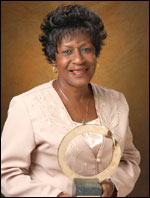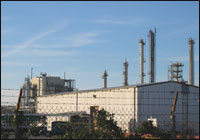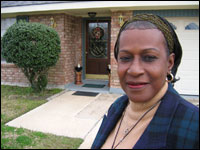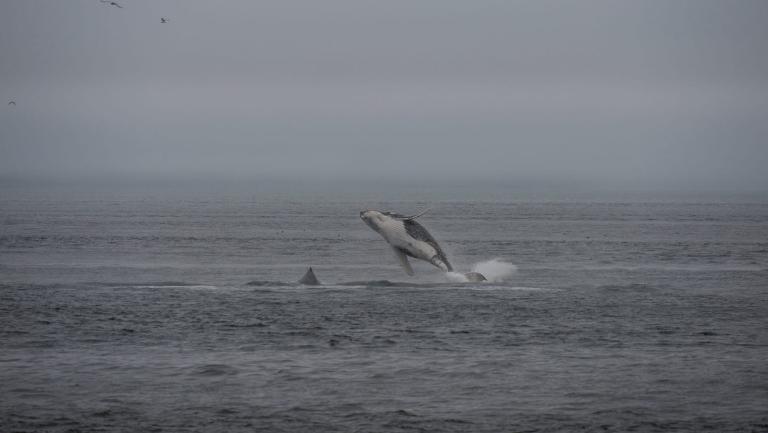
Eugene-Richard.
Photo: Goldman Environmental Prize.
The Old Diamond neighborhood of Norco, in far southern Louisiana, sits between a Shell Chemicals plant and an oil refinery owned by a Shell joint venture. “We’re like the meat in the sandwich,” says Margie Eugene-Richard, 62, who grew up just 25 feet from the fenceline of the chemical plant. For decades, the 1,500 residents of this predominantly black neighborhood suffered unusually high rates of cancer, birth defects, and respiratory diseases. They didn’t sleep well, either — they lived in fear of a major industrial accident, like the 1973 pipeline explosion that killed an Old Diamond woman and a teenage boy.
Eugene-Richard is the leader of Concerned Citizens of Norco, a citizens’ group that has fought for fair resettlement of Old Diamond residents. Eugene-Richard and other group members negotiated with Shell, unsuccessfully battled the company in court, and even organized citizen “bucket brigades” to test the air in Norco. In 2002, after some 13 years of work, the group reached a full relocation agreement with Shell. Since then, the company has bought 200 of the 225 lots in the neighborhood for at least $80,000 per lot, and most residents have chosen to move to nearby towns.
Eugene-Richard now advises other “fenceline” communities in the United States and abroad. On April 19, she was awarded one of the 2004 Goldman Environmental Prizes in San Francisco, Calif. She spoke to Grist from San Francisco.
How were your family and neighbors affected by the Shell plant and the Motiva refinery?
In the 1950s, there was an extension of the refinery right into the front yard of Old Diamond. It became a nuisance because of the noise, flares, and odors — the daily operations affected the people in town. The elder people were always coughing, and some had respiratory diseases. My sister died at a very early age from a rare bacterial disease. We were constantly faced with black soot falling on the grass, on our houses. So there were a lot of complaints everywhere you went, and finally I said, “We’re not getting anywhere talking among ourselves. We have to make this known.”
What inspired you to begin your battle with Shell?
There were quite a few incidents. In 1973, a pipeline ignited and caused a family to be killed. At that time I had finished college and was teaching in my hometown. That explosion caused a lot of hurt and panic, and caused fear to set in. Some of the elderly people became organized, but that effort died out. In 1988, another explosion [at the refinery] rocked the whole town. This is when the community got together, and the elderly people elected me as a leader. I felt the call from the divine ruler, from God himself — I knew I had to do something.

Eugene-Richard grew up in a house 25 feet from this Shell Chemicals plant.
Photo: Jim Iocona.
Did Shell provide jobs to the community — and if so, did that make people reluctant to criticize the company?
Many of the whites were employed by Shell, but not many blacks. My oldest daughter was a chemist and microbiologist for Shell at the time [that Concerned Citizens of Norco was organized]. I had some fear; I thought that some harm could come to my daughter because of me. But she said, “I know your heart is not in it for the wrong reasons.” So I said my prayers and pressed on. I knew it was for good, not just for the town but for the industry — because we all need each other. Still, deep within I wonder if someone will try to do some injustice to her because of me. But I can’t let fear hold me back.
What did you find was the most effective strategy?
Communicating without hostility — communicating with truth, coming face to face with community people, government, and industrial people. The changes needed to come from within the government, the people, and the industry. We had the Clean Air Act, the Clean Water Act, the Civil Rights Act, and the Good Neighbor Policy that had been written by the industry. My plea was that we had all this written on paper — there had to be some accountability for following what was already written. We had a strong organization, a group that dealt with facts. We didn’t believe in violence, we believed in negotiation with a purpose.
We thought that maybe the industry didn’t know how much we were hurting and suffering — maybe they needed to be told. When we weren’t heard on the local level, I cried out that I would take this to a higher level, from our front yard to the world. When I went to Holland [to confront Shell officials], my prayer was, “God, please don’t let me go in vain.” There were people behind me, the Concerned Citizens of Norco, and there were times that we prayed all night.

Eugene-Richard in front of her new home.
Photo: Jim Iocona.
Your 2002 agreement with Shell provided for relocation of your entire neighborhood. Where do you live now?
I live now in Destrehan, La., very close to Norco. Most people who have moved away live half an hour or 15 minutes away. They still attend the same church, still have close contact with each other — it’s very difficult to tear yourself away from your historical roots. I go back and pick pecans in my old yard, and when I go walking on the levee I bring my grandkids. The agreement is very good, however — most people are pleased with their new homes.
What remains to be done in Norco?
We’re planning a multipurpose building for more education and job training. There’s also a need for some sort of clinic for people who are suffering from chronic effects.
How do you think the environmental movement as a whole can better address environmental justice and environmental racism issues?
When the mass environmental community helps [grassroots environmental justice groups] to network, they build collaborations and a tide of understanding. When they do their part to push for enforcement and compliance, they promote environmental justice.
What does this award mean to you?
It’s like a dream come true. I’ve met people who have common struggles, from South America, from Africa — this award means everything.
What will you do with the money?
I have completed theology school, and I can’t wait to get started with my ministry. We’re going to minister to every child who needs love, and we’re going to create good, smart kids who can build cleaner industrial facilities. We’ll start in Norco — next, Texas, maybe Africa. Who knows?


